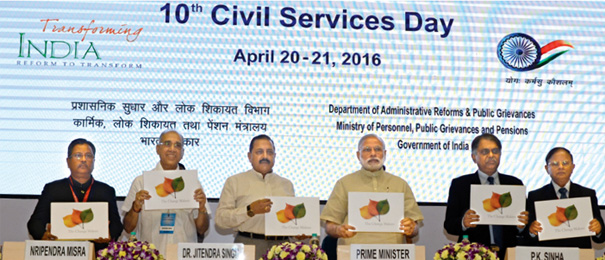You should be proud to tell your grandchildren what you did, affecting the lives of common people by taking decisions in favour of the people, and not be telling them about your material accomplishments,” Prime Minister Narendra Modi said to civil servants on Civil Services Day. He said that every bureaucrat should have at least one such feather in his cap during his career spanning 38 years.
Addressing the civil servants, the Prime Minister recalled Sardar Vallabhbhai Patel’s vision of the civil services of independent India, and the role of the civil services in national integration. Today, socio-economic integration should also be an objective of the civil services, he said adding, the national unity implies an end to the digital divide, urban-rural divide, and all forms of socio-economic inequality. He said the entire administrative machinery should be geared up to serve the needs of society. “Sheelam Param Bhushanam,” (character is the highest virtue) the Prime Minister reminded the civil servants, urging them to maintain a positive outlook.
It used to be only a one-day affair so far, but Civil Services Day this year was given added significance by the Ministry of Personnel, Public Grievances and Administrative Reforms. It was observed for two days, April 20 and 21, at Vigyan Bhavan in New Delhi. Four themes, comprising the social sector, housing, employment and agriculture, marked the day this year. Many authorities on these subjects participated in the deliberations, which were followed by question and answer sessions. The day was celebrated after a gap of one year as it was not organised last year due to general election. The government gave away the Civil Services Awards for 2012-13 and 2013-14 together.
The Social Sector was the opening theme of the first day. The Minister for Human Resources Development, Smriti Zubin Irani, chaired the session. Other speakers included Dr Vinod Paul of All India Institute of Social Sciences, Professor Govinda of NEUPA, retired IAS officer SC Behar of Azim Premji Foundation and Anil Sinha of the World Bank group.
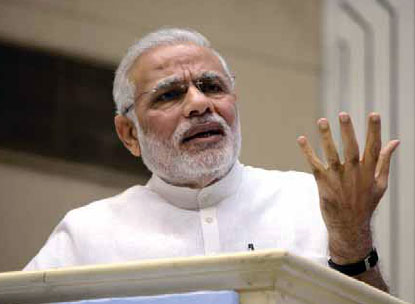
The deliberations concluded that there was an immediate need for penetration of the knowledge bank. Inclusive business models needed to be adopted, comprising low-cost fuel renovation, and there should be more refresher courses for teachers, it was felt. The speakers also stressed the need for skill development of frontline workers. The need for greater inter-departmental coordination was felt along with inclusive development through partnership in addition to strong lifestyle womb-to-tomb approach and use of technology for healthcare.
This was followed by deliberations on the Housing theme. The Vice-Chairman of NITI Aayog, Dr Arvind Panagariya, chaired it. State Bank of India Managing Director B Sriram, retired IAS officer Dr M Ramachandaran, Mahindra Lifespaces CEO Anita Arjundas, IAS officers Sitaram Kunte and Sachin Jadav were other speakers.
The deliberations pointed out that housing for all has been envisaged till 2022 and that the Union Budget 2015-16 has a provision of two crore houses in the urban sector and four crore in the rural sector. However, the obstacles to achieving this were availability of land, high cost of finance, procedural delays and other inadequacies. Housing, however, is a state subject and the Centre deals with policy planning only. The suggestions in this regard comprised full availability of land, creation of a repository for best practices, rent control reforms, rapid transport system, affordable housing in core infrastructure areas and rationalised duties and taxes on affordable housing.
Next on the agenda was the theme of Employment, Skill and Entrepreneurship. The Minister for Skill Development, Entrepreneurship and Parliamentary Affairs, Rajiv Pratap Rudy, chaired the session. Other speakers included, QCI Chairman Adil Zainulbhai, Mohandas Pai of Manipal Global Education Services, RCM Reddy of IL&FS and IAS officer Sonal Mishra.
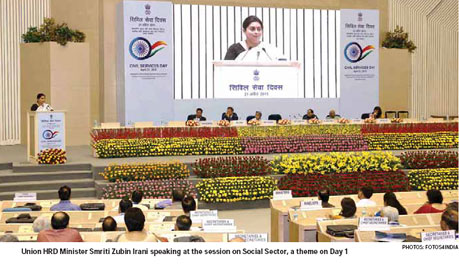
The session revealed that the Indian workforce has to considerably grow over the current 800 million by 2022 and that today only 2 per cent of the workforce is skilled and literate. South Korea, with 96 per cent, tops the skilled and literate workforce lists, followed by Germany (75 per cent) and the UK (68 per cent). The session enumerated the measures to be taken in this regard-bringing awareness about vocational education, creating awareness about the National Skills Qualification Framework (NSQF), creation of National Career Counselling Centres and decentralised planning for states.
The second day started with deliberations on the agriculture sector. Dr Ashok Gulati of the Indian Council of Research on International Economic Relations (ICRIER) chaired the session. Other speakers were Dr RS Paroda of the Trust for Advancement of Agricultural Sciences (TAAS), Dr Pramod Joshi of the International Food Policy Research Institute (IFPRI) and retired IAS officer Ashish Bahuguna. The thrust of the deliberations was on concerns like viability of going for a particular crop, risk factor involved and the inefficient markets as there is a wide gap between the produce source and the market, maps are outdated and the land title system is by and large defective. What was needed was technology, enabling institutions and policies and infrastructure development in addition to the need to strike a balance between research and development and the concerned departments as the farmer was deprived of the right knowledge to reap the benefits of innovation.
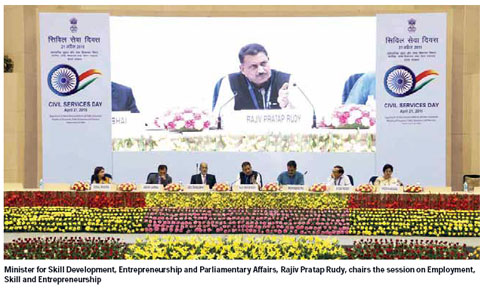
The plenary theme of the function was ‘Context and Challenges of the Civil Services and the Way Forward’. Railway Minister Suresh Prabhu chaired this session. The panelists comprised retired IAS officer TSR Subramanian, Shekhar Gupta of The India Today group, Foreign Secretary Dr Jaishankar and retired IPS officer K Vijay Kumar.
Former Cabinet Secretary TSR Subramanian said that there should be political reforms along with administrative reforms as earlier the district magistrate lived for his district as he was attached to it. Today, the Chief Minister’s Office takes the smallest of decisions. Shekhar Gupta said that 95 per cent of bureaucrats were fundamentally honest but 99 per cent were bureaucratic. He said challenges before the bureaucracy were more today because, when the British had devised this system, there were only 40 to 45 crore Indians who were very poor.
Dr Jaishankar said that the number of Haj pilgrims has gone up by 11,000 after the liberalisation of the Indian economy. Last year, 45 lakh visas and 99 lakh passports were issued. Besides, he said, 18 per cent of the budget of the Ministry of External Affairs was in establishment as diplomacy is a campaign. Adaptation is a challenge that services have been facing and so is coordination between different services and the government. He also said that the Ministry of External Affairs had raised more revenue than it spent. Retired IPS officer K Vijay Kumar also expressed his thoughts on the occasion.
Speaking on the occasion, the Minister of State for Personnel, Administrative Reforms and Public Grievances, Dr Jitendra Singh, said that during the British Raj the ICS collector was supposed to collect revenue, But, after six decades, the present-day IAS collector is supposed to generate revenue.
The minister also emphasised his government’s trust in the youth of India and added that there could be no compromise on national interest. He said that literacy could be the key to a developed India in which women had to be educated and emphasis should be laid on sanitation, hygiene and human development. The minister announced exclusive yoga sessions for civil servants on June 21, the International Yoga Day. The plenary hall of Vigyan Bhavan was overflowing with attendees at the plenary session of the ninth Civil Services Day on April 21.
Prime Minister Narendra Modi stole the show. He said that a bureaucrat’s life should not remain confined to files. Though civil servants were good at time management, they needed to spend quality time with their families, he said. A stressful life with hectic schedules and circumstances cannot do justice to any cause. How would they run such a large country if they become dull, he asked. He added that he needed colleagues filled with energy.
The Right to Intervene?
by MG DEVASAHAYAM
CONGRESS-LED UPA gov ernments headed by Prime Minister Manmohan Singh gave India’s citizens several Rights— Information in 2005, Forest in 2006, Food and Education in 2009. Right to honest government came through the Lokpal, which is yet to see the light of day. Access to basic services, the very raison d’etre for the existence of governments, has become a Right in several states! As the government was drafting the Right to Housing, the 2014 elec tions intervened and the UPA was packed off. Otherwise we would have been loaded with many more ‘Rights’.
The BJP-led NDA and its Prime Minister, Narendra Modi, does not want to be left behind. And so he has come out with his own Rights formula on Civil Services Day 2015—The Right for Political Intervention: “In a democracy, bureaucracy and political inter vention go hand-in-hand. This is the speciality of democracy. If we have to run this country, we do not require political interference. But political intervention is necessary and inevitable, otherwise democracy will not work. Political intervention is required in a democracy as legislators are elected by the people. Political interference destroys.”
Free dictionary defines interven tion as “the systematic process of assessment and planning employed to remediate or prevent a social, edu cational or developmental problem”, whereas interference is “the act or an instance of hindering, obstructing or impeding”. So what the PM said is very true.
But the problem is with the word ‘political’ which the same Free dic tionary defines in various ways:
1. Relating to, or dealing with the structure or affairs of govern ment, politics, or the state i.e. a political system.
2. Relating to, involving, or charac teristic of political parties or politi cians i.e. a political campaign.
3. Interested or active in politics i.e political person.
4. Influenced by, based on, or stem ming from partisan interests or political ideology i.e political insti tution/political crimes.
5. Based on or motivated by selfserv ing interests, especially in attempt ing to gain power i.e political maneuvering
As long as the PM’s intention is confined to definition 1, it is perfectly all right because this is the role of elected politicians in a democracy and there are well-defined institutions and mechanism for the purpose. They function as part of the governance sys tem—framing of policies, enactment of laws, approving projects, allocation of budget and oversight of implemen tation. These need not be called inter ventions! Bureaucracy works under this system and all civil servants are trained and oriented towards this. But unfortunately, this species constitute only a small fraction of the current ‘political’ milieu.
The real problem is ‘intervention’ by politicians other than elected representatives. Political parties do most of the interventions and this is not proper since these entities neither have constitutional man date nor laws and rules governing their functions. Almost all who are active in politics are influenced by partisan interests and their intervention would be injurious to fair, just and equitable govern ance. Of late, mafia interests have deeply penetrated politics, both inside and outside the legislature. Allowing them to intervene will sound the death knell of democracy and good governance. In the event, the Prime Minister, as the highest political executive of the country, must clearly spell out as to what he meant by ‘political intervention’ and who are the politicians who fall in the eligibility category.
As to political interference, it destroys the very fabric of administration. Since it mostly happens at the cutting-edge level, it is extremely injurious to public interest. After this exhortation by the Prime Minister, civil servants, particularly those in the field, should not only resist political interference, but also protect junior officials who dare to do so!
The audience mainly comprised senior bureaucrats, including Cabinet Secretary Ajit Seth, former Cabinet Secretaries TSR Subramanian, Prabhat Kumar, and secretaries to the Government of India, chief Secretaries of states and an overwhelming majority of officer trainees.
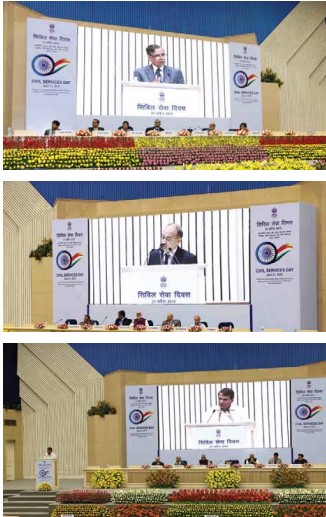
Drawing a distinction between political interference and political intervention, the Prime Minister stated that the first one ruined the system but the other was necessary and inevitable in a democracy to ensure public interest-driven decision-making. Political intervention is a must in a democracy as legislators are elected by the masses, he said.
The Prime Minster also called on civil servants to hold what he called the yuva mitra day by visiting colleges and talking to students about why they chose civil services over more lucrative avenues. They should also share their experiences with the youngsters to inspire them, he said.
Originally slated to speak for half an hour, the Prime Minister communicated with the audience for more than an hour, keeping them spellbound. He also mooted the idea of honouring retired bureaucrats over the age of 75 and making an effort to learn from their experiences. Modi also spoke in favour of a system in which anybody retiring from the service-from a peon to a chief secretary-would write down his experiences and learnings, which can then be stored on the ‘cloud’ online. The Prime Minister stressed the need of restoring institutional memory as governments can’t run without that.
In this regard, he lamented that the practice of leaving a note to the successor had become defunct from the bureaucratic system. Taking a dig at the tendency of going by the book, the Prime Minister also pointed out that it took an earthquake of devastating proportions to include other natural calamities in disaster management. He said earlier there were only droughts and floods in disaster management. When an earthquake hit Bhuj in Gujarat in 2001, only after that earthquake was also listed among disasters. “Why should we wait for anything like that to happen?” he asked.
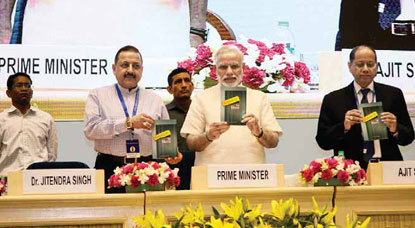
Referring to a Goldman Sachs report that India would take a decade to reach the Asian average on government effectiveness, Modi sought to drive home the urgency of carrying out administrative reforms. He urged the bureaucrats to work as a team to take on the challenges ahead, develop a large institutional memory bank and, at the same time, help raise the next generation of civil servants.
The Prime Minister also stressed the importance of ART-accountability, responsibility and transparency. He said good governance is not possible without ART. The Prime Minister said that teams of officers from various states should take up as case studies the award-winning projects and ensure that they were adopted as best practices wherever possible.
The Prime Minister conferred the ‘Awards for Excellence in Public Administration’ for the years 2012-13 and 2013-14 to outstanding initiatives in Public Administration. He also released a book, Best Practices-Tomorrow is Here.
The event was managed efficiently by Secretray Alok Rawat and Special Secretary Arun Jha (now Secretary, Tribal Affairs) of the Department of Administrative Reforms and Public Grievances.















































